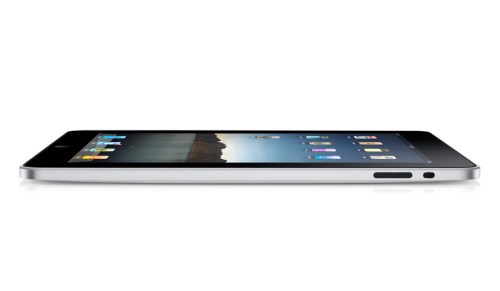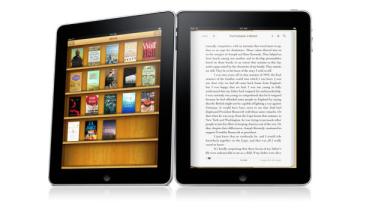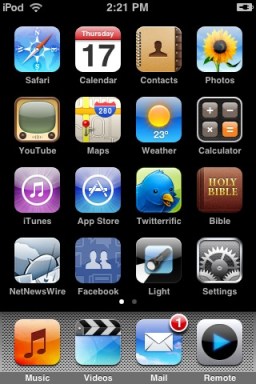Many people are underwhelmed by Apple’s much-anticipated release of the iPad. There’s no camera. No very surprising features. All it really is? A giant iPhone. And that’s precisely why the iPad is a game changer.
by Alexis
+
Devs Plotting for the iPad
+
What was happening while consumers were digesting the news? Developers across the world were clamoring to get their hands on the software development toolkit (SDK) download from Apple so that they could get to work. But why should we care about what developers do? Here goes:
The iPad has two killer strengths that it shares with the iPhone:
- Symbiosis
- Distribution
+
I scratch your back…
+
Apple’s original genius with the iPhone was not about the phone/browser/iPod triple threat. The true brilliance of the iPhone is the advent of the App Store. And with the App Store comes one of the most symbiotic relationships between a company and developers ever created.
Once Apple opened the iPhone up to developers, they provided a level playing field. Developers create and provide the content. Apple takes 30% of the profits, but provides the developer with a virtually unlimited platform from which to launch their ideas. In theory, the market decides which apps are good, and which aren’t. In reality, there is a bit more marketing involved. But all can agree that the barrier to entry is low.
This is why the app store was a game changer: you make an enticing sandbox for developers to play and produce in, and they will build some absolutely amazing sandcastles. Tapping into the creativity of thousands of bright, hungry programmers is exactly why Apple seen such success with the iPhone and iTouch.
Bigger Possibilities
+
The iPad follows the same concept. Except this time, the possibilities are broader. A larger screen. Better OS features with iPhone OS 3.2. Features that I unfortunately am not at liberty to talk about yet, because Apple has all their developers sign non-disclosure agreements when we experiment with beta versions. But what I can say is the obvious:
+ HUGE screen real estate, which means more to touch and interact with.
+ More room to gesture, swipe, pinch, flick, heck, maybe even PALM the screen, means game and app developers can come up with all sorts of novel new ways of interacting with this very large touch screen.
+ Just looking at all my apps after seeing the iPad demo makes me feel scrunched. I believe after this, people will wonder how they ever played games on the iPhone before.
Just think about the way you explain something to someone when you review diagrams or pictures on a computer monitor. You touch the screen. You gesture at it. It’s instinct. That was the genius of the iPhone. But with more real estate, and a brand new operating system crammed full of features, you are going to really have to change the way you think about interacting with games, with your files and with your data.
We can’t imagine yet the wonders the developers will create, but that’s just it–they will come. And Apple knows this because of what happened with the iPhone. When I hit WWDC for the first time last year, plastered to the sides of the Moscone Center West where the convention was held, were bright, colorful pictures of hundreds of app icons. The apps were the focus. And demand from developers on a platform creates demand for the app. It’s a strange loop, but it will work again:
+Developers, dreaming of riches and of pushing the limits of technology, devise brilliant ideas to best utilize the strengths of the new platform.
+These apps make the device increasingly appealing.
+Apple promotes the best of these apps in TV ads.
+The apps drive more sales of the device.
+More devices present creates a bigger market share.
+Bigger market share creates more dreams from more programmers.
+Repeat.
+
More than a Kindle-Killer
+
 Now what about distribution? Jobs predicted that this is the intersection of liberal arts and technology. I think that’s a huge understatement. This is the death of publishing as it’s existed for decades. People in technology and media have long been talking about push vs. pull distribution mechanisms. (If you need context, look at the brilliant paper, “The Glittering Allure of the Mobile Society.”) This device is the ultimate pull platform.
Now what about distribution? Jobs predicted that this is the intersection of liberal arts and technology. I think that’s a huge understatement. This is the death of publishing as it’s existed for decades. People in technology and media have long been talking about push vs. pull distribution mechanisms. (If you need context, look at the brilliant paper, “The Glittering Allure of the Mobile Society.”) This device is the ultimate pull platform.
The iPad will support the ePub framework. ePub is a free and open standard for publishing books, already adopted by many publishers. Perhaps better than adopting this standard is the iBooks app. The level playing field that developers have in putting apps on the app store? Imagine if this were extended to books, magazines and movies.
This possibility was not lost on @ScrivenerApp, an excellent piece of book-drafting software for the Mac. Following the iPad announcement, they tweeted: “On the plus side, Scrivener 2.0 exports to .epub, so you’ll be able to create books for iBooks. ” In other words, write your novel, and publish it to iBooks. No agents, no publishers. Just you, your book and the market.
 Now, I hear you. Can’t I self-publish on the Kindle, too? And you can. You can go through their Digital Text Platform or through Create Space. But this is about numbers. The strength of ANY distribution platform–be it a movie production studios or a old-fashion book publisher–relies on its REACH. Apple has the ultimate reach. Three billion apps have been downloaded over the last two years. Three BILLION.
Now, I hear you. Can’t I self-publish on the Kindle, too? And you can. You can go through their Digital Text Platform or through Create Space. But this is about numbers. The strength of ANY distribution platform–be it a movie production studios or a old-fashion book publisher–relies on its REACH. Apple has the ultimate reach. Three billion apps have been downloaded over the last two years. Three BILLION.
Now, only time will tell how many books fly through iBooks, but we do know that Apple knows how to gain market share. Granted, the Kindle has been moving volumes — a recent stat is that they sell 6 Kindle e-books for every 10 hardcopies. But who is going to want to read on a Kindle, when they can have a slicker device that’s in color, plays movies, browses the web and allows access to 140,000 third-party apps? There’s no contest.
Even more importantly, though, than the possibility of self-publishing and a more level literary playing field, is the question: What do books look like in this new world? Do books have more pictures? Embedded video? Are they interactive? To which I say, why not? This delivery device makes it so easy, it seems to me that our very conception of books will transform with the iPad.
So while many skeptics sit around disappointed, meh-ing the iPad’s lack of flash, a camera, HD and so on, I–and thousands of others like me–are getting busy reading, writing and experimenting for this new platform. I suggest, for your sake, you do the same.



At first you know I was expecting a lot from the iPad but maybe I was expecting too much. I wanted it to replace my Macbook Pro and now I think that’s clearly not going to happen but between the iPad and the Kindle I think I’m going to opt for the iPad. I think it’s only saving grace was the 10 hour up time but again that’s an optimal average. We’ll have to wait and see if it really live up to 10 hours or not. Here’s a public opinion poll about the iPad listing the top 10 good and bad things about it. http://www.baduku.com/topics/apple-ipad_187
I think I’ll hold out for the iSlate with a full versioned OSX and OLED screen.
Yeah I know, no Flash and no camera…I still think it’s a great product that will only get better. Price will come down, memory will go up within a year or two.
But what about the fight over the iPad name with Fujitsu? It’s going to be real interesting to see where this story goes. Will Apple actually have to give up the name iPad at this stage in the game? Wow, that would be a site to see.
Check it out:
http://www.ipadlot.com
How enormously different do you think reactions would have been if they had called it an iPlus? The name iPlus would have acknowledged that it wasn’t quite the tablet laptop everyone thought it would be as well as the fact that it looks like a giant iPod with more awesome abilities AND IT WOULDN’T MAKE EVERYONE THINK OF BLEEDING VAGINAS.
Yeah, I’m still sore about it. Mostly because I want one but I don’t know if I could bring myself to ever call it by name.
But, but, but… couldn’t they have negotiated with the Federation for the use of the name “PADD” instead? Geeks everywhere would be stampeding for it! Well, okay, and if it came with a bonus comm badge.
Even though it kills lots of trees, I hope real, physical books never go away. As much as I love technology, I don’t think it could ever replace the friendliness and comfort of a real book.
at least books aren’t made out of plastic? trees are a renewable resource so i think there will always be real books. i think the main thing i like about them is seeing how far through a book i am by judging the thickness.
Truth. I also like to write/underline in my books.
>>Apple takes 30% of the profits, but provides the developer with a virtually unlimited platform from which to launch their ideas. In theory, the market decides which apps are good, and which aren’t.>>
Except for the part where Apple arbitrarily decides to pull some apps because they’re “inappropriate” or whatevs. And enforces their rules very inconsistently.
I love the iPad and it’s possibilities. However, I’m going to hold fast to my first rule of new Apple products: don’t buy first gen.
I want it, and I want it know. I would be neat is Rev 2 has a webcam and ichat then it will really have some Star Trek shit going on.
This is hands-down, the best written, best researched, most objective and comprehensive article I have read so far about the iPad and its capabilities.
Very VERY well done. Seriously.
Now i’m very excited to be able to publish my book.
Do they have something up their sleeve to make it easier to stare at if you plan on reading for several hours? That’d make me want it.
I feel exactly the same way. I cannot read a book through a screen. I get massive headaches.
I’m an Apple fan, but here’s why I can’t get behind the iPad. First of all, the interface may be great for developers, but people have to buy it first (see: launch of the PS3). Second, I don’t think it’s going to be a Kindle-killer either because of the glossy screen. Third, it’s a pretty crappy product. I mean, Apple does the whole “add basic features later and call them revolutionary” scheme a lot but they failed miserably in trying to spin the iPad as a well-made device. It can’t even be called a big iPhone because it doesn’t have a camera. I’ll certainly be keeping track of how this goes. Like a shiny, black-bezeled cat, Apple always manages to land on its feet.
I gotta say you’ve turned my natural skeptic attitude towards this product to a wait-and-see type attitude. Excellent article!
This is a great article, and I totally agree with its perspective.
1. When the iPod came out, people were critical of the iTunes store, saying it would never have ALL the songs in the world, and it would not be enough to wipe away CDs. But it happened, and the iPod has changed the way we listen to music.
2. Same story when the iPhone came out: many people were puzzled and were like “there’s nothing special about it, no big innovations”. But they had yet to see the applications potential. One app store and 3 billion applications downloaded later, people got it. It seemed nothing special, but it changed the smartphone industry.
3. I am sure the same will happen with the iPad. An enhanced platform for developing new, better “mobile” applications. If Amazon has sold a few million Kindles, imagine what sales of, say, 50 million iPads can do. All the books and magazines in the world are going to be available for it. The media world is going to be taken by storm. With the iPod it was music, with the iPhone it was mobile phones, and now the iPad will revolutionize the publishing industry and possibly to some extent the video / television industry as well.
And by the way, I’m tired of buying paper books. I’m longing for the day when even rare and scientific books will be downloadable to some electronic reader. I believe the iPad is the closer we’re gonna get to it.
Apple isn’t new with the App Store concept – mobile phones have had something similar for a while, and it’s basically a packet manager, something Linux/Ubuntu (At least) has had integrally.
Also the iPad is mainly DRM-based, which affects control over the books you purchase: http://www.defectivebydesign.org/ipad
http://24.media.tumblr.com/tumblr_kwxh3hhmjq1qa4bkqo1_500.jpg
I feel like I have to preface my negativity by saying that I have and always will love Apple. I don’t think we should break up…we just need a break. This new thing just isn’t working out for us. We obviously want different things from life.
The economist in me loves this article and sees the potential for the iPad. However, the consumer in me isn’t in love with Apple’s newborn baby. Sure there are tons of benefits for developers and for Apple (and its stockholders) in the future, but what about immediate benefits for the consumer?
Apple missed two key demands from its audience: Multitasking capabilities and application support (ie: I’d like to be able to open a damn pdf or word document on my iPhone and more importantly an iPad in the future.) I could care less about a camera and flash–save that for my iPhone.
Part of the problem is probably that we built up so many expectations for the iPad; hoping it would be revolutionary and the next step up from the macbook. We set ourselves up for disappointment, to a degree.
I most definitely won’t be purchasing a first generation iPad. I do hold out hope that Apple will open its ears to the demands of its consumer base the second time around and add on some of the base features that we all want (and need.)
I can open pdf and word documents on my iPhone. I can also edit word documents. With the iPad you’ll be able to open Office documents, edit them, and send them in iWork and pdf format (this already from 1.0, this before developers conceive of better apps for handling documents).
Yeah out of sheer irritation, I went on a google rampage to find an app that would allow me to actually work from my phone like I could with my Blackberry. Whaddya know, there’s an app for that. However, it’d be nice if when I got the document in my email I could just effing open it. Maybe it’s just my phone with some gross application issues. Very good possibility.
I’m still having a hard time understanding the reasoning of using iWork on there. Yes, it’s an Apple native and an obvious choice, I suppose, but it’s not what’s globally used…I like that you’ll be able to edit them and send them as pdf documents…however there would be situations where you’d want them to remain Office documents…I dunno. I guess I need to rewatch the keynote & Apple video. I wasn’t glued to it by any means.
I want to love the iPad. I really do. Sigh.
Well, if Microsoft Office landed on the Mac at some point, why stop there? Why not go on to the iPad? I really hope it does. I think there’s a high chance it will. That would mean I’d be glued to the iPad more than I already am to my iPhone.
Thanks for this article its was really informative
i am now convinced that the iPad is not a revolutionized tampon.
thank you
i can always count on autostraddle for everything =)
ok then…but the holy bible? WTF?!